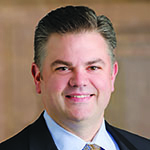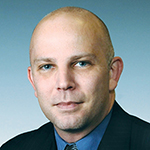By LISA EISENHAUER
Ethical and privacy safeguards are "baked into" everything Truveta will be doing with patient health data, says Marcus Shipley, senior vice president for innovation and chief information officer at Trinity Health.

Shipley
Trinity Health is one of the 14 systems partnering in the new data analysis venture that will allow researchers to mine de–identified patient records for insights. "As we created Truveta, all of our health systems had ethics and the ethical use of this data as a requirement for standing it up," Shipley says.
The company will comply with the privacy regulations of the federal Health Insurance Portability and Accountability Act. In addition, the uses of the data will be overseen by a governing board that includes representatives from its founding health systems and by an ethics subcommittee that will ensure that the focus of the research aligns with the missions of the participating health systems, Shipley says.
He adds that Catholic systems that are part of the partnership can have their data excluded from any research project that they see as potentially in conflict with the Ethical and Religious Directives for Catholic Health Care Services.
Cyber risk management
SSM Health is developing its own data-sharing partnership with The Advanced HEAlth Data (AHEAD) Institute at Saint Louis University — a new center for data-driven innovation and research. Dr. Ann Cappellari, chief medical information officer at SSM Health, says the virtual data warehouse that will be created will provide state-of-the-art data security.
Nevertheless, Cappellari acknowledges that as security measures advance, so do the skills of hackers and their potential to "reidentify" data that's been through the de-identification process. De-identifying data "alleviates privacy concerns to the best of our ability right now, but nothing is foolproof," she says.
Leslie Hinyard, director of the AHEAD Institute, says researchers' requests for use of the SSM Health data will have to be narrowly crafted and pass the scrutiny of an institutional review board and faculty members with expertise in the field of research. "There are a number of levels of people looking at every question along the way to ensure that research questions are ethical and that the data is never misused," Hinyard says.
No researcher will have access to the entire database, only the specific subsets needed for their projects.
Staying transparent
Dr. Amy Compton-Phillips is president of clinical care at Providence St. Joseph Health, another of the Truveta partners. She says the partnership is being transparent about its purpose and mission early on, before it starts marketing itself to customers.
"The reason we announced this publicly before data started moving anywhere is we want to make sure people know what we're doing, that we're doing this above board, we're doing it in the daylight," she says. "We're doing it in a way that protects information so that we can continue to advance health care and not have it be a surprise."
Compton-Phillips says she and leaders of the other systems behind Truveta understand that patients want their personal data kept private and see that privacy as sacrosanct. "That said, we also have to allow learning. If we didn't allow learning in health care, we would never know that controlling blood pressure stops strokes. We would never know that the antiviral remdesivir and plasma help patients with COVID. That is learning."

Sanders
Alan Sanders, vice president of ethics integration and strategy at Trinity Health, said of Truveta, "the goal of this is to make use of this data in a more timely fashion — to kind of speed up research to help solve diseases and hopefully improve medicine."
Human element
While he's not worried that the data sharing that happens through Truveta will violate patients' privacy, Sanders does have concerns that as analytics figure more into treatments the human element of medical care may diminish.
"I know there's something to be said about human contact, face-to-face relations, and I think we have to continue to highlight its importance as we evolve" in the use of predictive analytics in patient care, Sanders says.
Cappellari also worries about the human element — the therapeutic relationship between clinician and patient — being diminished in health care. However, she sees other factors playing a bigger role in that than data and technological advancements will. Processes driven by artificial intelligence might be impersonal, but they have shown their potential to save lives by reducing errors in areas such as prescribing medications and setting dosage, she says.
"Overall, I think the manner in which we allow care delivery to be really driven by a fee-for-service reimbursement model is a far greater risk to losing that human element than AI is," says Cappellari.